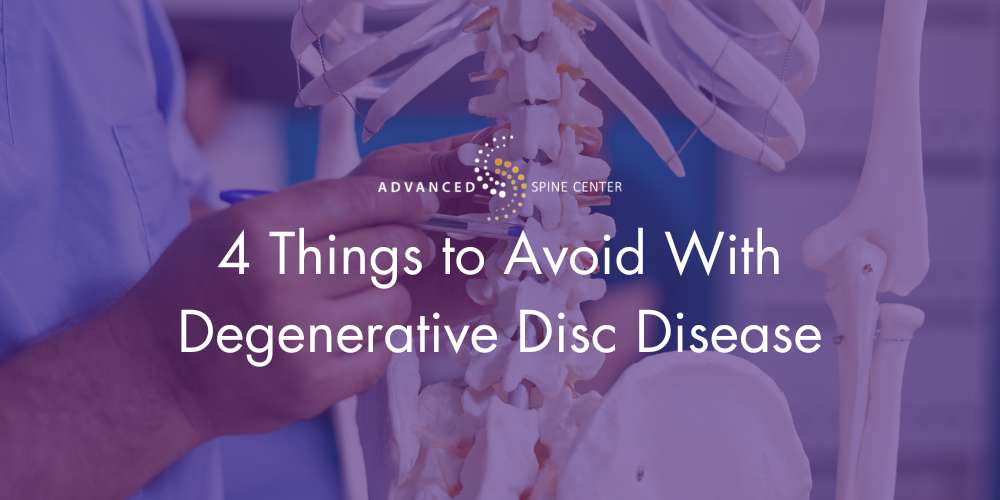Table of Contents
What Is Degenerative Disc Disease?
Degenerative disc disease is a progressive condition that affects the rubbery pads found between the vertebrae of the spine, and it decreases your overall physical health. These discs are susceptible to damage caused by aging, other diseases, and injuries. This leads to back pain and stiffness. These discs act as shock absorbers and can worsen by ignoring pain. A proper diagnosis can help with the constant pain and alleviate the excessive stress.
How Fast Does Degenerative Disc Disease Progress?
Once a spinal disc is injured, it cannot be repaired by itself. The state of the disc can deteriorate over a span of 20 to 30 years. Pain makes the movement of the back very difficult, and the bone where the injury occurs becomes unstable. These risk factors can pose a threat to the body and cause a reduction in physical activity, weight gain, and neck pain, and require a treatment plan.
What Are Some Things to Avoid With Degenerative Disc Disease?

Degenerative disc disease can be a painful and frustrating condition that has a difficult healing process, but understanding the connection between your lifestyle and spine health can empower you to take control. Learn more below about what to avoid when you have degenerative disc disease. Whether you are currently dealing with degenerative disc disease or want to proactively prevent it, this article provides practical tips and insights to help you feel your best and help with pain management.
1. Avoid Sitting for Long Periods of Time
Sitting for a long time can make lower back pain worse and potentially contribute to lower back degenerative disc disease. To prevent stiffness and strain on your spine, make sure to get up and move around every 30 minutes if you sit for long durations. Proper posture can relieve pressure for extended periods and help fight inflammation in your daily life.
2. Avoid Improper Lifting Techniques
Heavy weightlifting exerts excessive pressure on the spine, accelerating disc wear and causing leg pain. Deadlifts and any workout involving twisting are especially risky in this regard. Despite these risks, weight training can be an excellent form of exercise. To protect your spine, work with a physical therapist who can recommend safer exercises involving lower weights and higher repetitions.
3. Avoid Using Medications Too Often
Over-the-counter pain medications can provide temporary relief but are not suitable for long-term use. Prescription medications can also be effective, but they carry risks of side effects and dependency. Using temporary relief medications for too long can lead to central nervous system issues and loss of consciousness.
Your provider may suggest an alternative, such as steroid injections. These offer a low-risk, fast-acting option compared to the prolonged use of over-the-counter and prescription medications for degenerative disc disease back pain relief. In this procedure, your healthcare provider injects medication near the affected spinal structures to reduce pain and inflammation. Consult your provider to discuss the risks, benefits, and alternatives of steroid injections and to determine if you are a candidate for this treatment.
4. Avoid Foods That Cause Inflammation
Obesity is a significant risk factor for degenerative disc disease. Therefore, maintaining a healthy diet with certain foods that are rich in benefits and act as anti-inflammatory foods, such as vegetables, fruits, fatty fish, low-fat dairy products, lean proteins, and whole grains, can aid in weight loss or help maintain a healthy weight. While research on specific foods and degenerative disc disease is inconclusive, studies indicate that sugary drinks, white bread, pastries, and processed snacks can elevate blood sugar levels, triggering inflammatory pathways that may make the pain associated with degenerative disc disease worse.
Additionally, proper nutrition with a high consumption of meat and processed meats has been linked to increased levels of C-reactive protein, an inflammatory marker, in individuals with chronic back pain. Foods high in saturated and trans fats, such as fried foods, can also heighten inflammation, potentially contributing to degenerative disc disease. Lastly, caffeine and alcohol can lead to dehydration, which is considered a primary factor in disc degeneration.
Degenerative Disc Disease Work Restrictions
Managing symptoms and movement is beneficial for the spine. Sitting for long periods of time reduces blood flow to various structures in the back. Regular movement helps lubricate the spinal joints and provides essential nutrients to the discs.
Although poor posture itself does not directly cause back pain, which is a long-held misconception, certain postures can worsen symptoms if you already have back pain. Maintaining a neutral spine while lifting can be beneficial if you are in pain. People with low back pain often have a stiffer squat and altered mechanics compared to those without pain. These factors should be considered while in a work environment to avoid worsening spine problems.
Things to Avoid With Degenerative Disc Disease in Neck and Spinal Discs

To avoid developing degenerative disc disease or worsening a previous condition that can cause severe pain, stay aware of things like heavy lifting, high-impact activities, twisting, and improper movements that can strain the back and exacerbate symptoms. This includes exercises such as jumping jacks, plyometrics, Russian twists, and medicine ball throws with rotation.
Also, avoid prolonged sitting in the same position for extended amounts of time and slouching. Bad posture can reduce blood flow to your back and cause more pain.
Inflammatory foods like fried foods, soda, red meat, sugar, and processed meat can contribute to increased inflammation and worse symptoms and should be avoided as much as possible.
Other habits, such as smoking, can speed up the deterioration of intervertebral discs and worsen degenerative disc disease symptoms. Consuming more than moderate amounts of alcohol and taking painkillers as well as high-impact sports can also be very problematic and accelerate disc degeneration.
Degenerative Disc Disease Self-Care
There are many healthy habits you can do to promote a strong spine, such as staying active, doing core workouts, practicing good posture, and stretching. Regular exercise for as little as 30 minutes a day can make a major impact on your body. With lifestyle adjustments such as low-impact activities like swimming, walking, or yoga and exercises like planks, crunches, or bridges can support your spine and build strength.
Also, make sure to stand tall with your shoulders back and relaxed, and avoid slouching and hunching over. Lastly, stretching can help maintain flexibility and range of motion for your spinal health, which prevents stiffness and injury. These activities can alleviate pain, help you with maintaining spinal health, and manage symptoms that cause excessive strain.
Exercises for Degenerative Disc Disease
Deeper muscles gradually weaken due to decreased spinal activity, further destabilizing the spine and creating a self-perpetuating cycle of disease progression and loss of function. Workouts that build your muscle mass help remove excess weight that may aggravate symptoms.
A spine specialist in Plano can prescribe exercises to help strengthen and stabilize the spine, such as strengthening core muscles, which slows the disease’s progression. These exercises, known as spine stabilizing exercises, are typically performed under the supervision of a physiotherapist and help strengthen core muscles that allow comfort for the spinal cord and herniated discs.
The best exercises for spinal disc disease are activities such as walking, hamstring stretches, stationary biking, cat-cow stretches, back extensions, knee-to-chest stretches, and pelvic stretching.
Is Walking Good for Degenerative Disc Disease?

Walking as a daily activity can help prevent the progression of degenerative disc disease. Whether it’s free walking, treadmill walking, or walking with equipment, this exercise can strengthen the paraspinal muscles and prevent atrophy and undue strain.
Research has shown that consistent walking reduces back pain. There’s no significant difference between slow and brisk walking. The key is to keep the spinal, paraspinal, pelvic, and abdominal muscles active without putting strain on the spine.
Degenerative Disc Disease Physical Therapy
Physical therapy can help treat degenerative disc disease by focusing on strengthening the muscles that support the spine, improving flexibility and mobility, and teaching proper body mechanics to reduce strain on the discs. Therapists use exercises, manual techniques, and education to alleviate pain, improve function, and prevent further deterioration of the discs.
While some spinal degeneration is inevitable as we age, there are numerous measures you can take to preserve strength, balance, and stability well into your golden years.
What to Do If Your Degenerative Disc Disease Progresses Too Far
If your condition worsens or progresses to the point where it significantly interferes with your daily life and activities and causes pain, we strongly advise considering surgical interventions aimed at addressing the underlying spinal issues. These interventions may include procedures such as lumbar injections, which can provide targeted relief by delivering medication directly to the affected area, or more extensive interventions like a lumbar microdiscectomy, aimed at removing herniated disc material to alleviate pressure on the nerves.
In cases of severe spinal instability or persistent symptoms despite conservative treatments, lumbar fusion surgery may be recommended. This procedure aims to stabilize the spine by fusing two or more vertebrae together, reducing pain and preventing further damage.
It’s crucial to address spinal issues promptly, as untreated conditions can lead to worsening symptoms and potential complications. Without proper treatment, ongoing damage to the spine may result in chronic pain and could potentially lead to nerve damage or other serious health issues.
How We Can Help With Managing Degenerative Disc Disease

At Advanced Spine Center, we provide a range of specialties to diagnose and treat various conditions, including cervical fusion, injections, revisions, and surgeries to aid in your recovery. Dr. Stephen Courtney, a board-certified orthopedic surgeon, leads our team of orthopedic specialists. He is affiliated with esteemed medical organizations such as the American Medical Association, the Collin/Fannin County Medical Society, the American Academy of Orthopaedic Surgeons, the North American Spine Society, and the American College of Spine Surgery.
Call the Advanced Spine Center for Degenerative Disc Disease Treatment in Plano, TX
Dr. Courtney’s dedication to innovation has led to the development of his own line of FDA-approved surgical tools, Eminent Spine®, designed to enhance patient experience and surgical outcomes with the help of healthcare professionals. With 18 patents and 15 trademarks to his name, he also provides training to orthopedic surgeons nationwide on the use of these advanced surgical instruments.
If you’re struggling with pain from degenerative disc disease, trust the team at Advanced Spine Center in Plano to get you back to living your active life.










